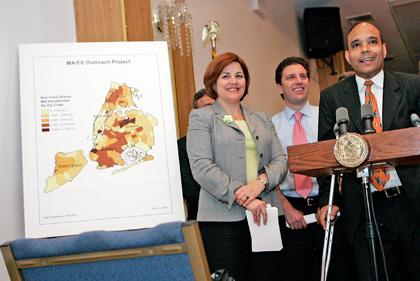By Anna Gustafson
Outreach efforts have prompted a spike in the number of Queens residents on food stamps after the city targeted the borough as the first stop in its campaign to enroll low−income residents who did not know they were eligible for the program.
City Council Speaker Christine C. Quinn (D−Manhattan), together with Deputy Mayor for Health and Human Services Linda Gibbs and Human Resources Administration Commissioner Robert Doar, announced the increase Monday.
Since late July, thousands of Queens residents enrolled in the Medicaid or Family Health Plus program have received a letter explaining they may also be eligible to use food stamps. Since the letters went out, more than 14,000 Queens residents have applied for food stamp benefits, and nearly 9,000 of those individuals are now receiving recurring food stamps.
City officials plan to conduct outreach efforts similar to what they did in Queens in the rest of the boroughs, and letters — translated into nine languages — were sent to the Bronx in October and Manhattan residents received the information earlier this month. Brooklyn and Staten Island are slated to get the letters early next year.
“I am thrilled that the data match outreach has already proved successful in just a few months in the first borough targeted,” City Coucil Speaker Christine Quinn (D−Manhattan) said in a prepared statement. “This benefit provides so many hardworking New Yorkers that are struggling with difficult financial times help when it comes to feeding themselves and their families.”
With Thanksgiving here and winter holidays just around the corner, food prices continuing to rise and New Yorkers losing jobs, food stamps have been a hot topic among Queens legislators.
Last week, Councilman Eric Gioia (D−Sunnyside) demanded that Costco, a membership warehouse club chain, change its policy and begin accepting food stamps from the 1.1 million New Yorkers currently using food stamps.
According to a release issued by Gioia, the Costco on Vernon Boulevard in Long Island City is within walking distance for nearly 30,000 residents of Queensbridge, Ravenswood, and Astoria Houses housing projects, but the chain does not take food stamps.
Other major food chains, including Pathmark, Stop & Shop, Waldbaum’s, Trader Joe’s and Whole Foods accept food stamps.
“In tough economic times, more New Yorkers are turning to wholesale retailers like Costco to cut costs while also eating healthy,” Gioia said in a prepared statement. “Accepting food stamps will give the million New Yorkers who use the program the chance to make healthy food a regular part of their diet.”
Costco officials did not return phone calls for comment.
U.S. Rep. Anthony Weiner (D−Forest Hills) said last week that there has been a 23 percent increase in New Yorkers using food stamps since 2004. In 2008, more than 129,000 city residents enrolled in the food stamp program — 30 percent more than the previous three years combined, according to statistics compiled by the city Department of Social Services.
While efforts to bring people on board with the food stamp program have been successful, Weiner said more needs to be done to reach an estimated 500,000 of the city’s low−income residents who may not know they are eligible for assistance.
He called on city officials to eliminate the finger imaging requirements for individuals who want to receive food stamps, urged the federal government to lift the ban on able−bodied adults without dependents from receiving food stamps and called for $25 million to be added to the food stamp program to provide grants to farmers markets that will install an electronic card reader.
Participants in the food stamp system use an electronic card, which looks like a debit or credit card, to purchase their goods.
Pat Purcell, director of special projects for UFCW Local 1500, which represents supermarket employees, said he also hopes to see more of an increase in the number of residents taking advantage of food stamps.
“It’s not a crime to be on food stamps, especially now in these financial times,” he said. “More people are using food stamps than ever before, but we want that number to keep going up.”


































